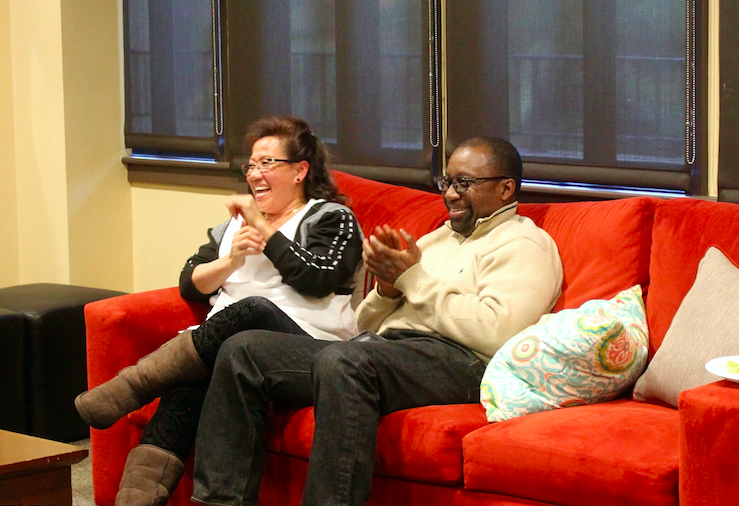From navigating broken blenders to mildewed shower tiles, campus workers shared their experiences working for the University at a Thursday storytelling event highlighting personal narratives related to workers’ rights. The community service committee of the Pilipinx American Student Union (PASU) hosted the event at the Asian American Activities Center (A3C) with the goal of showing solidarity and appreciation for service workers on campus.
“We basically wanted to have an event where we could facilitate communication between students and workers on campus,” said Valory Banashek ’21, who co-organized the event with Alyssa Romanos ’21 and Jana Mauricio-Lee ’21. “Oftentimes we’ll go through our day-to-day as students and not really communicate with them unless we’re swiping through the dining halls or using the bathrooms.”
Cowell Cluster custodian Lourdes Wilson and Branner Hall custodian Jimmy Brigabriel discussed difficulties and rewards of working at Stanford after immigrating to the United States from the Philippines. They noted how daily tasks can be more taxing than one may expect.
“Sometimes students put their trash in the bathroom and there’s a broken blender or something that makes it too heavy,” Wilson said.
Wilson, who has worked at Stanford since 1983, previously served on a workers’ committee for health and safety. She spoke about supporting the administration on an initiative to reduce injuries by making trash bags clear and by installing steps to increase accessibility to dumpsters. The clear trash bags allow custodians to see if there are items such as broken bottles inside.
Brigabriel and Wilson agreed it is particularly difficult to scrub showers, with Wilson noting that, “a lot of workers get hurt.” Brigabriel mentioned instances in which he hit his head on a showerhead while cleaning.
“The tiles in Branner are really old, so you have to clean them every week,” he explained.
Wilson stressed the importance of renovating buildings on campus while keeping in mind how those renovations will affect service workers who clean and maintain them, but she said the administration is becoming much more responsive to workers’ needs.
“Now [the administration] is listening because a lot of employees are getting hurt,” Wilson said.
However, Wilson also noted the “good benefits” that come along with working at Stanford, adding that she has formed many close relationships with students over the years.
“You can speak to them everyday, and sometimes they talk to you in different languages,” Brigabriel said, adding that past students helped him improve his Spanish after he told them the only Spanish word he knew was “burrito.”
Romanos said starting conversations between students and workers might be uncomfortable at first, but added that it is important for students to build relationships with people who have different roles on campus.
“Contract negotiations [for campus workers] are underway,” Romanos added, “so the timing of the event is really important. We also know that every year SCoPE does something at Parents’ Weekend to advance the rights of workers and housing justice issues, so we thought it was well-timed.”
Thursday’s event came on the heels of several campus demonstrations held by Stanford Coalition for Planning an Equitable 2035 (SCoPE 2035) last week in protest of Stanford’s lawsuit against Santa Clara County’s housing ordinance. Filed in both the state and federal court on Dec. 20, 2018, the Inclusionary Housing Ordinance requires Stanford to make at least 16 percent of its future rental housing units available at an affordable housing cost.
In a public statement responding to the lawsuits, the University acknowledged that affordable housing remains a critical challenge for many of its workers, while also arguing that the Ordinance “applies only to a single entity, unreasonably targeting Stanford and violating constitutional principle rights.”
SCoPE, however, sees the issue differently, calling ensuring affordable housing for Stanford’s workers a “moral issue” in a public Facebook post on the morning of the demonstrations.
“We cannot afford housing here,” said Wilson, who lives in Los Banos and commutes over four hours round-trip to get to work each day. “You have to do what you have to do to survive.”
Audience members at the event included students, staff and representatives of the Silicon Valley Workers Project.
“Hearing Lourdes’ and Jimmy’s stories makes me feel like I actually have a place to make a better change,” said Mellisa Risano, the Leave and Disability Manager for Residential and Dining Enterprises (R&DE). Risano, who has only held the position for two months, said her goal is to minimize injuries for workers and colleagues.
The event organizers presented Wilson and Brigabriel with flowers and thank-you cards following their discussion.
“I feel like I’m part of a family here,” Wilson said. “I love the students and I care about them.”
Contact Regina Kong at reginak ‘at’ stanford.edu.
